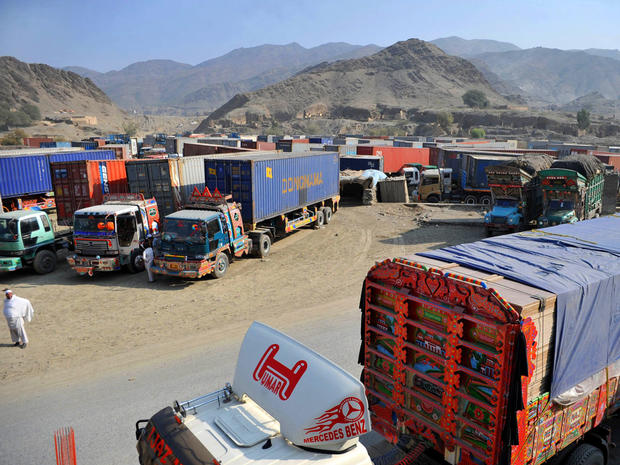Pakistan militants vow to stop U.S. supply route
(CBS NEWS) ISLAMABAD - Some of Pakistan's most notorious Islamic militants on Wednesday vowed to stop the resumption of a critical land supply route to U.S- led forces in Afghanistan.
At the same time, one of Pakistan's most prominent militants held a defiant news conference, a day after the U.S. slapped a $10 million bounty on him.
"I am here, I am visible. America should give that reward money to me," Hafiz Mohammad Saeed, the 61-year-old founder of the militant group Lashkar-e-Taiba, told reporters Wednesday.
Pakistani militant taunts U.S. over $10M bountyU.S. offers $10M bounty for Pakistani militant
U.S. enemies in Pakistan getting organized
Saeed is accused of masterminding the 2008 attacks on the Indian city of Mumbai that killed 166 people, including six Americans.
Washington's decision on Monday to slap a bounty on Saeed appeared to mark a significant U.S. hardening towards groups thought to be connected to Pakistan's army-run intelligence services.
In the past, American officials acknowledged Lashkar-e-Taiba's growing ability to launch terrorist attacks beyond Pakistan but stopped short of putting bounty on Saeed, so as it not destabilize the region.
The $10 million price tag is on par with rewards for some of the most notorious Taliban militants in the region.
Saeed, an Arabic language and Islamic studies professor, has been an advocate for the secessionist movement in Kashmir, a disputed territory between India and Pakistan. The two nations have fought three wars and numerous skirmishes over the territory.
"More than the bounty itself which is a large amount, the message from the U.S. is clear," a senior European defense official speaking on the condition of anonymity told CBS News. "We are not prepared to tolerate hard line militants freely roaming around Pakistan."
In a related development, the Difa-e-Pakistan Council, composed of hardcore Islamists and nationalists, wants Pakistan's ruling establishment to seek tougher policies toward the U.S.
They want to suspend the land based supply route to Afghanistan which Pakistan closed following American air strikes in November that killed 26 Pakistani soldiers in November at two posts along the Afghan border.
Pakistan's parliament is currently debating relations with the U.S. and is expected to resume the matter on Thursday.
"We will protest any move to allow the land route to be reopened (to Afghanistan)," said Maulana Samiul Haq, a prominent Islamic cleric who chairs the Difa-e-Pakistan Council.
Hameed Gul, former director general of Pakistan's spy agency, the ISI, told CBS News "this bounty will only make our people more angry. In Pakistan, anti-Americanism is already running high and this step will add to anti-U.S. sentiment."
Gul said "the bounty is widely seen in Pakistan to have been applied by the U.S. at the behest of India".
A member of parliament from the ruling Pakistan People's Party told CBS News on condition of anonymity that the controversy surrounding Saeed will make it harder for the government or individual legislators to be seen taking conciliatory steps towards Washington.
"Islamic political groups in Pakistan are not the most popular. But they have a tremendous ability to be a nuisance" he said. "These people will stage angry protests and use violence ... which will bring new pressure on our government."
The Difa-e-Pakistan Council announced planned public demonstrations on Friday and demanded President Asif Ali Zardari cancel his upcoming trip to India to meet with prime minister Manmohan Singh.
